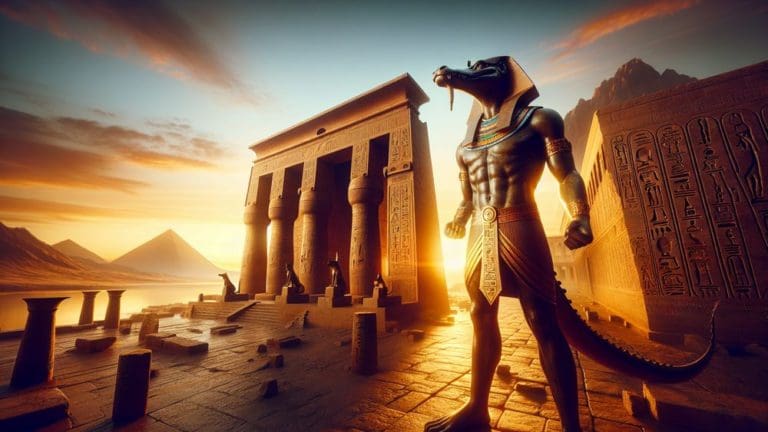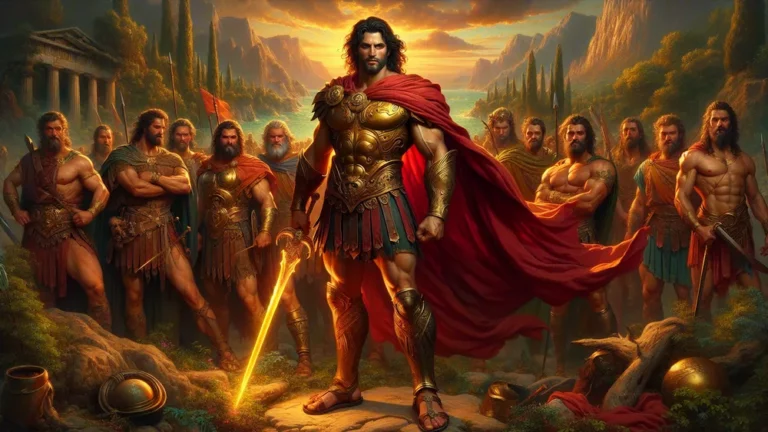Sophrosyne: The Spirit Of Moderation In Greek Mythology
When you jump into Greek mythology, there is a world full of not just gods and never-dying heroes, but also deep ideas about life. One important idea is sophrosyne, which stands for keeping things in the middle, being in control, and staying balanced.
Like today’s need to split time between work, family, and fun, sophrosyne was seen as a way to keep both yourself and the community in peace. It was an idea very much a part of ancient Greeks’ spiritual and everyday lives, affecting their stories, thoughts, and actions. It was so important that wise men taught it, and both gods and humans in myths had it too.
Yet, like many Greek tales, how people talk about sophrosyne differs a lot, showing different sides in different stories. This opening explains how we will look deeply at what sophrosyne means in these myths, its important themes, and how much it matters in the world of values humans hold, as seen through famous characters and old Greek stories.
Sophrosyne: Overview and Key Facts
| Key Aspect | Description |
|---|---|
| Definition | Sophrosyne is a Greek word that means moderation, self-control, and balance, seen as one of the main ideas in Greek thought and life. |
| Etymology | Coming from Greek words ‘sōphrōn’ (right mind) and ‘syne’ (together), it highlights how mind and spirit work together. |
| Cultural Significance | Thought important as it meant a way of living that stayed away from extremes, while staying natural and using reason. |
| Philosophical Interpretations | Plato and Aristotle, thinkers of ancient times, saw sophrosyne as key for happiness by keeping wants and feelings in check. |
| Mythological Representations | In many stories, gods and heroes act with balance, not pride; this balance matters for everything to stay right. |
| Contrast with Hubris | Put often against hubris, which is being too proud, with many tales showing how people lost their way without moderation. |
| Influence on Law and Society | It left an impact on rules and community living, aiming for fair justice and balanced people in charge, thus shaping Greek rule and life. |
| Enduring Legacy | The ideas of sophrosyne still mean a lot today, showing up in ways of thought and actions that put balance and knowing yourself first for a full life. |
The Idea of Sophrosyne in Greek Myths
As you look at the full world of Greek mythology, it’s easy to find how sophrosyne is part of the old stories and legends. This idea shows us the long-lasting importance of keeping things balanced.
Breaking Down Sophrosyne: What It Means and Where It Came From
This idea has spread through ancient Greek life, including virtues like self-control, balance, and moderation. From ‘sōphrōn’ meaning ‘sound of mind’ and ‘syne’ for unity, the word shows this togetherness. It’s part of moral traditions aiming for a mental state without too much or too little. Today, it’s like keeping both a balanced budget and diet. Greek thinkers and poets talked about sophrosyne a lot. Here are some examples:
- Plato: Thinks of it as key for a good mind and community, important in “Charmides.”
- Aristotle: In “Nicomachean Ethics,” it’s between having too much or too little, key to being good.
- Epicurus: Ties it to pleasures chosen with care, working with his idea of calm.
- Homer’s Stories: Characters often act with balance, controlling feelings is key for heroes.
- Maxims of Delphi: “Nothing in excess” and “Know yourself” show its big role in Greek ways.
These ideas stress how important sophrosyne was both for people’s traits and the shared beliefs that guided Greek life.
Sophrosyne, deeply rooted in ancient Greek culture, underscores the significance of moderation and balance in personal virtues and societal norms, frequently discussed by notable thinkers like Plato and Aristotle.
Sophrosyne and Other Greek Values
The quality of sophrosyne works inside the Greek system of good qualities, alongside other valued things like courage, wisdom, and fairness. In Greek thoughts, these qualities each have a part in balance, creating the main goal of human happiness. Sophrosyne means control and balance, courage brings strength to face fears, understanding helps with wise choices, and fairness means doing what’s right. While each has its focus, often, they overlap.
When someone uses sophrosyne, they keep their wants in check for peace, needing understanding to know the right path and bravery to stay balanced. These qualities highlight living well, like a good band where each part must play at the right time.
Here is a comparison of these key qualities:
| Greek Quality | Description | Modern Analogy |
|---|---|---|
| Sophrosyne | Means control, balance without too much or too little, keeping the mind calm. | Keeping a balanced life |
| Courage (Andreia) | Means being brave, facing and fighting fear and trouble. | Speaking up for beliefs even if it’s risky |
| Understanding (Sophia) | Means using knowledge, seeing things clearly, and making good choices. | Choosing wisely at important moments |
| Fairness (Dikaiosyne) | Means being fair, acting right personally and in groups. | Following rules and treating fairly |
The Greek way of these qualities means they understand human actions well, wanting people to help their community positively. Greek ideas often mean these qualities need each other to help a life be honest and with direction.
Stories of Sophrosyne in Myth Characters
Now, we look at the world of Greek myths, where the idea of sophrosyne appears through how famous characters act and their stories are remembered.
Apollo – Showing Balance and Peace
In Greek stories, Apollo is seen as a god who means balance and calm. His jobs include music, prophecy, healing, and the sun. Apollo, the god of many duties like music and healing, means a mix of qualities that help see moderation, a key part of sophrosyne.
When you think of him playing the lyre, an instrument that means calm and order, it appears that he brings peace to a wild world, a lot like using music therapy today to make calm places in healing situations. Throughout myths, Apollo often acts as a go-between.
For instance, in the Trojan War story in Homer’s “Iliad,” he uses his power to balance things by helping the Trojans against the strong Greek armies, which means he supports balance instead of letting one side get too much power. We also see Apollo’s link with sophrosyne through his messages and guidance, often with moderation and wisdom.
In Delphi, where people honor him as a god who tells the future, his priestesses deliver messages needing careful thought, making people patient and wise. With maxims like “Know thyself” and “Nothing in excess,” tied to Apollo’s ideas, he puts important ideas of sophrosyne in the culture, reminding folks of the value of knowing themselves and acting with care.
Therefore, through balance in godly and human areas, Apollo stands as an example of living in peace and with thought. His stories continue to matter for the endless need for balance in both personal and societal life.
Penelope’s Tale: How Patience and Calmness Shine
In “Odyssey” by Homer, you see Penelope as an example of patience and calmness. She means sophrosyne by staying calm in long times of not knowing and trouble. She is Odysseus’s loyal wife, left alone while he’s away; her life shows balance and steady behavior. In this story, she handles the constant push from suitors wanting to marry her and thereby saves Odysseus‘ place.
Her plan to marry again only after weaving a shroud, then undoing it secretly each night, means calm resistance. Today, it’s like handling challenges by taking small, careful steps to reach goals. Penelope’s story is more than being clever and patient; it’s clear how her calmness and smart planning make home balance despite pressures from men around her.
These traits fit well with today’s view of strong leaders who solve problems while staying clear-headed under long pressure. Her loyalty and smart ideas are not seen as just being passive but as acting wisely. This mirrors today’s crisis handling where leaders need a steady focus to come up with solutions when things change. Her qualities teach about hanging on and adapting in tough times, like those qualities we value in leaders now.
Importantly, Penelope is honored for being smart, as smart as Odysseus, both in being loyal and clever, ensuring her patience is not seen as weakness. Her skill in seeing the truth from looks showed when Odysseus returned, by asking him to reveal their bed’s secret, only known to them.
This wise thinking and smart doubt prove her as an equal to Odysseus, showing sophrosyne’s aim for emotional and thinking balance. Unlike other figures in Greek stories whose lives follow wild emotions or anger, Penelope’s tale urges finding peace inside and planned actions, asking readers to see the standing worth of staying true with calm and balance.
Her story is a never-changing message of the strong power in patience and strategic calmness, key for success alone and in shared efforts.
How Theseus Took on the Minotaur with Sophrosyne
In the tale of Theseus and the Minotaur, Theseus shows sophrosyne with his careful plan to handle what seemed like an impossible problem. He, a hero from Athens, goes into a tricky maze, made by Daedalus. Success, not from strength or rushing; he uses thought and organized way.
With string from Ariadne, Minos‘ daughter, Theseus means thinking ahead and balance by using careful steps to move around the maze, then find his way back after killing the wild Minotaur. Planning carefully and thinking ahead, Theseus suggests how patience and strategy make hard jobs possible, kind of like how professionals today might plan out tasks and make backup plans to succeed. Also, in this tale of the Minotaur, Theseus’ way fits with sophrosyne values.
He uses caution, not falling into overconfidence, often seen in Greek tales as a fault like hubris. Not only on physical strength or fast plans, Theseus combines smartness, bravery, and patience – important for a full character in Greek ideas.
The journey he takes through the maze points to needing mental readiness and standing firm under stress, similar to how today’s people use thinking and problem-solving in tough spots. Through this well-known story, Theseus’ way means the lasting strength of moderation and planned steps, proving that real heroism can be the smart mix of bravery and foresight.
Sophrosyne’s Effect on Greek Life
After we look at how sophrosyne’s role was with famous characters, we’re going to dig into how this key quality formed daily life in Greece and also how it changed ruling times in those ancient days.
How It Shaped Greek Learning and Daily Life
Sophrosyne was important in Greek schooling, shaping how young people learned to think and act. For instance, Athens aimed to create well-rounded persons; sophrosyne was a key ideas in what they learned, helping students aim for a balanced mind and morals. They taught kids the idea that balance between physical training, thinking, and acting right is important. It is like today’s schools trying to build thinkers with balanced views.
Much like many schools nowadays might look at students’ feelings together with learning, Greek teachers taught sophrosyne by using talking skills, thinking deeply, and moving education, which helped kids to use self-control. In everyday actions, the idea of sophrosyne was in how Greek groups worked, pushing for balance in personal and public ways. This idea changed how people acted together, making for stronger communities.
The Greeks knew that sophrosyne was needed not just for people’s health but also for keeping life in cities safe. By sharing smartly in the way people acted and in ruling, it made sure resources were handled carefully, like today’s talk for fair ways of living and leading.
This idea, being part of events, festivals, and public choices, underlines its wide impact – you now have proof that balance is key to good living.

Sophrosyne played a huge part in Greek education by promoting balance in thoughts, morals, and actions, which helped shape individuals and strengthen communities.
Its Touch on Rules and Leadership
Sophrosyne meant Greek leaders handled things fairly, leading with balance and fairness in mind. Big thinkers like Plato and Aristotle said sophrosyne was a must-have quality for any leader. They talked about how rulers should mix their calmness with their city work, which helped make cities more safe.

This way of thinking showed in the making of laws, and these rules not only kept things in order but also made sure to keep a social balance, which meant sharing out power and resources carefully. Meanwhile, if we think about today’s leaders, the same idea means that those in charge should use balance and careful thought when making plans, balancing what everyone needs.
So, sophrosyne worked as a strong guideline for Greek leaders, moving them to act with care and self-control, ideas that still hold a lot of value today.
The Pantheon of Greek Spirits and Daimones
Spirits and daimones, in the myths of Greece, were in an interesting place between gods and humans, often meaning things like ideas, feelings, and powers that touched what people did every day. These beings were all sorts, from messengers of gods, like Hermes, to harmful ones like Keres, who watched over violent deaths.
Believed by Greeks, these daimones could affect daily things, being like fate-helpers, luck-bringers, or trouble-makers, similar to how some see luck or guardian angels today. For those curious about these strange figures, there is a list of Greek beings that tells their roles and stories.
FAQs
What is the relationship between sophrosyne and hubris in Greek mythology?
The relationship between sophrosyne and hubris in Greek mythology is one of contrast, as sophrosyne embodies moderation and self-control, while hubris represents excessive pride and arrogance, often leading to downfall.
How did Greek philosophers interpret sophrosyne?
Greek philosophers interpreted sophrosyne as a crucial virtue representing self-control and harmony within the soul, essential for achieving a balanced and ethical life.

Are there modern equivalents of sophrosyne today?
Modern equivalents of sophrosyne can be seen in contemporary values emphasizing balance and moderation in areas such as work-life harmony and sustainable living.

Which other myths provide examples of sophrosyne?
Other myths that provide examples of sophrosyne include the tales of Persephone’s return from the Underworld and Themis’s role in maintaining cosmic order.







